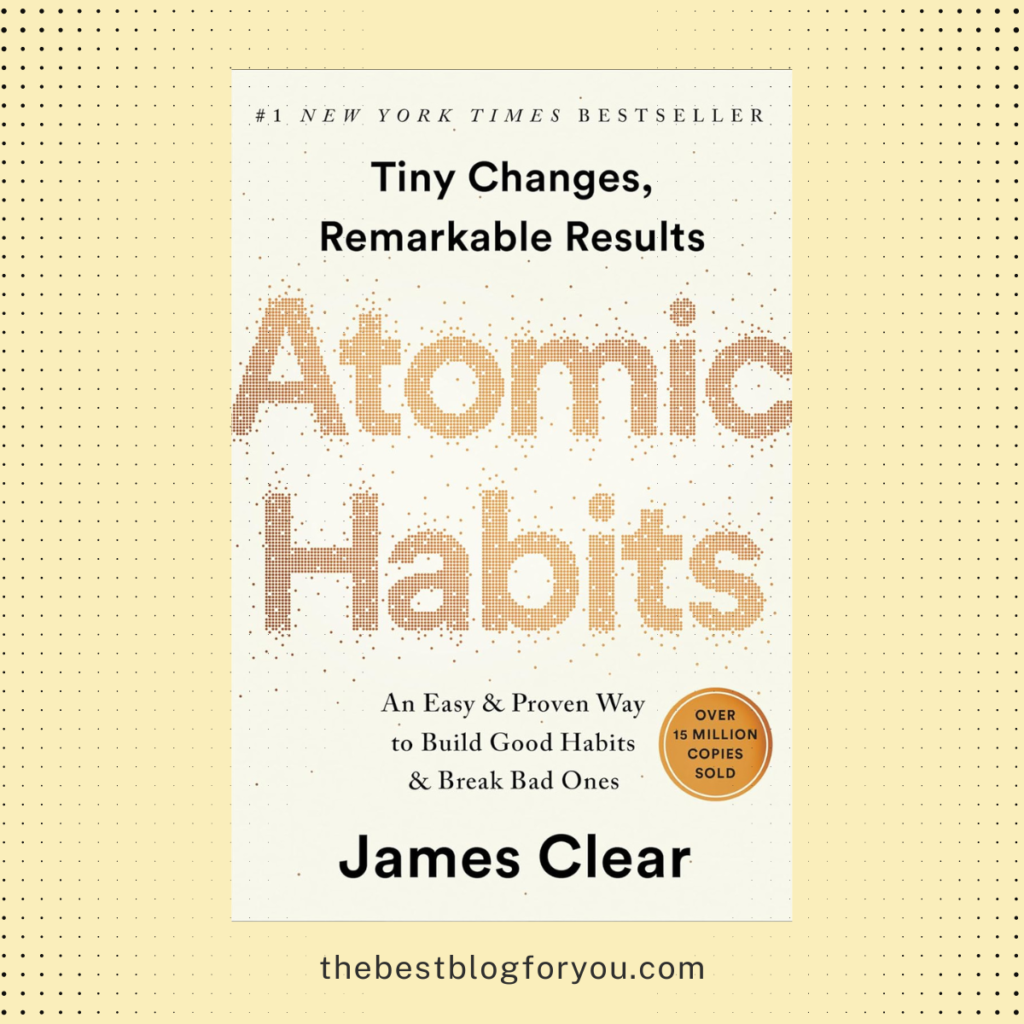
1. On the Power of Small Habits:
“Habits are the compound interest of self-improvement.”
Just as money grows through compound interest, the effects of your habits multiply as you repeat them. Small changes may not seem significant at first, but they add up over time to produce remarkable results.
“Success is the product of daily habits—not once-in-a-lifetime transformations.”
Success doesn’t come from a single, dramatic change but from the consistent application of small habits every day. This quote emphasizes that the key to achieving goals lies in the regular, seemingly minor actions we take.
2. On the Importance of Identity:
“Every action you take is a vote for the type of person you wish to become.”
Each habit you practice is a small vote for the person you want to be. Focusing on identity-based habits means asking yourself, “What would a healthy person do?” instead of merely aiming for a specific outcome like losing weight.
“The most effective way to change your habits is to focus not on what you want to achieve, but on who you wish to become.”
Shifting the focus from goals to identity can be transformative. When you see yourself as the kind of person who exercises regularly, for instance, exercising becomes part of your identity rather than a chore.
3. On the Role of Environment:
“Environment is the invisible hand that shapes human behavior.”
Our surroundings play a crucial role in shaping our habits. By designing your environment to support your desired habits, you make it easier to stick to them, such as by keeping healthy snacks visible and junk food out of sight.
“You do not rise to the level of your goals. You fall to the level of your systems.”
Having a clear goal is important, but it’s your daily systems and habits that determine your success. Instead of solely focusing on the outcome, concentrate on building processes that naturally lead you to your goal.
4. On the Importance of Repetition:
“The more you repeat a behavior, the more you reinforce the identity associated with that behavior.”
Repetition is key in habit formation because it strengthens the connection between your actions and your identity. Each time you perform a habit, it becomes more ingrained in who you are.
“It’s not about having something to do. It’s about becoming someone to be.”
This quote reinforces the idea that the ultimate purpose of habits is not just to perform tasks but to become the person you aspire to be through those consistent actions.
5. On Motivation and Willpower:
“Motivation is overrated; environment often matters more.”
Relying on willpower and motivation can be exhausting and inconsistent. Instead, structuring your environment to make good habits easier and bad habits harder can be a more reliable strategy for success.
“Make it easy to start and the rest will follow.”
The key to making habits stick is reducing the friction at the start. By making the first step of a habit simple and easy, you increase the likelihood of following through.
6. On the Four Laws of Behavior Change:
“The Four Laws of Behavior Change are a simple set of rules we can use to build better habits: make it obvious, make it attractive, make it easy, and make it satisfying.”
These four principles are the foundation of Clear’s approach to habit formation. By ensuring your desired habits are obvious, attractive, easy, and satisfying, you increase the chances of them becoming automatic.
“If you want to make a habit a big part of your life, make the cue a big part of your environment.”
Cues trigger habits, so integrating them into your environment is essential. For example, if you want to read more, keep a book on your bedside table to remind you each night.
7. On the 1% Improvement Rule:
“If you get 1% better each day for one year, you’ll end up thirty-seven times better by the time you’re done.”
This quote highlights the power of incremental progress. Aiming for small, consistent improvements rather than drastic changes leads to substantial growth over time.
“Forget about goals, focus on systems instead.”
Rather than obsessing over the end result, concentrate on the processes that will get you there. By refining your systems, achieving your goals becomes a natural outcome.
8. On Breaking Bad Habits:
“To eliminate a bad habit, reduce exposure to the cue that causes it.”
One of the most effective ways to break a bad habit is to remove the triggers that prompt it. If social media distracts you from work, keeping your phone in another room can help reduce the temptation.
“You can break a habit, but you’re unlikely to forget it. This means that simply resisting temptation is an ineffective strategy.”
Instead of relying on willpower to resist a bad habit, create an environment that reduces the need to resist in the first place. This might involve changing your routine, avoiding certain places, or replacing the bad habit with a good one.
9. On Accountability and Feedback:
“A lack of self-awareness is poison. Reflection and review are the antidote.”
Regular reflection on your habits and actions helps you stay aware of your progress and areas for improvement. This self-awareness is essential for making meaningful changes.
“Habit tracking provides immediate evidence that you’re moving in the right direction.”
Tracking your habits creates a visual cue of your progress, which can be highly motivating. Seeing a chain of successful days on a calendar, for example, can encourage you to keep going.
10. On Making Habits Stick:
“A habit must be established before it can be improved.”
Focus on establishing the habit first before worrying about perfecting it. For example, start by building the habit of going to the gym, even if it’s only for five minutes at first. Once the habit is established, you can gradually improve the quality of your workout.
“The greatest threat to success is not failure but boredom.”
Boredom can cause even the best habits to fade. To combat this, vary your approach to keep things interesting, and remind yourself of the bigger picture to stay motivated.
11. On Consistency and Persistence:
“Never miss twice.”
It’s normal to occasionally miss a day of a habit, but the key is to get back on track immediately. Missing once is a small setback, but missing twice can become the start of a new (undesired) habit.
“You don’t have to be the victim of your environment. You can also be the architect of it.”
This quote empowers you to take control of your surroundings. By intentionally designing your environment, you can create conditions that support your desired habits and goals.
12. On Mindset and Perception:
“Be the designer of your world and not merely the consumer of it.”
This statement encourages a proactive approach to life. Instead of passively accepting your circumstances, take charge of designing the life and habits that align with your goals.
“Good habits make time your ally. Bad habits make time your enemy.”
Time compounds the effects of your habits. Good habits can lead to exponential growth and improvement, while bad habits can cause a slow decline over time.
13. On the Power of Starting Small:
“Standardize before you optimize. You can’t improve a habit that doesn’t exist.”
Focus on creating the habit first, even if it’s in its simplest form. Once the habit is consistent, you can refine and improve it.
“Start with repetition, not perfection.”
Perfectionism can be paralyzing, so it’s better to start with simple, repeatable actions. Over time, repetition will naturally lead to improvement.
14. On Habits and Lifestyle Design:
“Your outcomes are a lagging measure of your habits.”
Results take time to appear. Your current habits might not show immediate results, but over time, they shape your future outcomes.
“Be patient with results and impatient with your actions.”
This quote advises being proactive with the actions you can control while understanding that results may take time to materialize.
15. On the Impact of Tiny Changes:
“Small habits don’t add up; they compound. It’s like adding interest to your bank account: accumulating massive rewards over time.”
Tiny changes may seem insignificant in the short term, but they have a compounding effect that leads to substantial results over the long term.
“You should be far more concerned with your current trajectory than with your current results.”
Focusing on the direction you’re headed, rather than where you are now, helps you stay aligned with long-term success.
16. On Making Habits Enjoyable:
“To make a habit stick, make it enjoyable.”
When habits are enjoyable, they are more likely to be repeated. Adding a reward or making the process fun can help solidify a new habit.
“The most effective form of motivation is progress.”
Seeing progress, no matter how small, is a powerful motivator. Tracking progress and celebrating small wins can keep you engaged with your habits.
Check out: Key Takeaways from the Atomic Habits Book by James Clear
